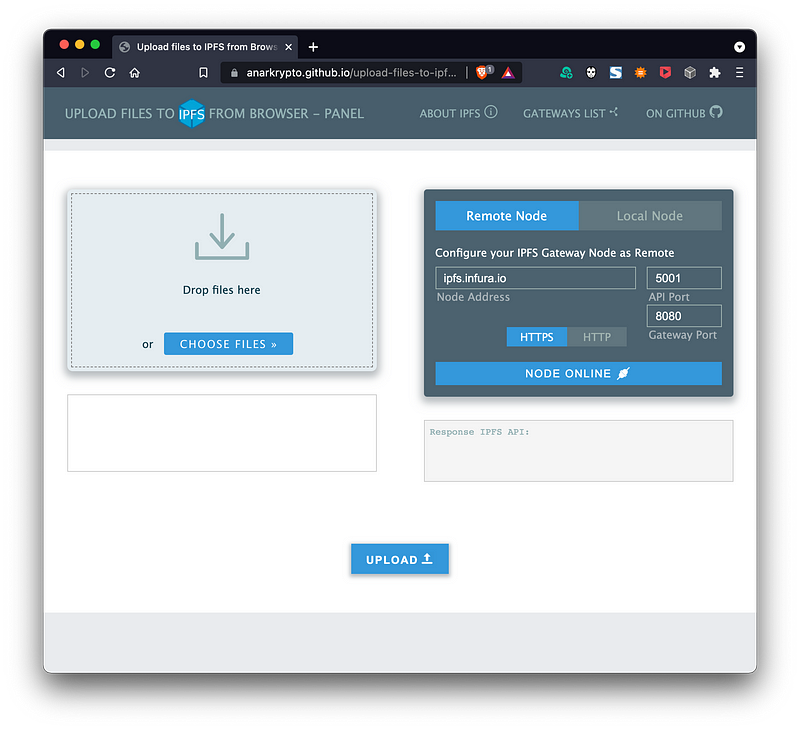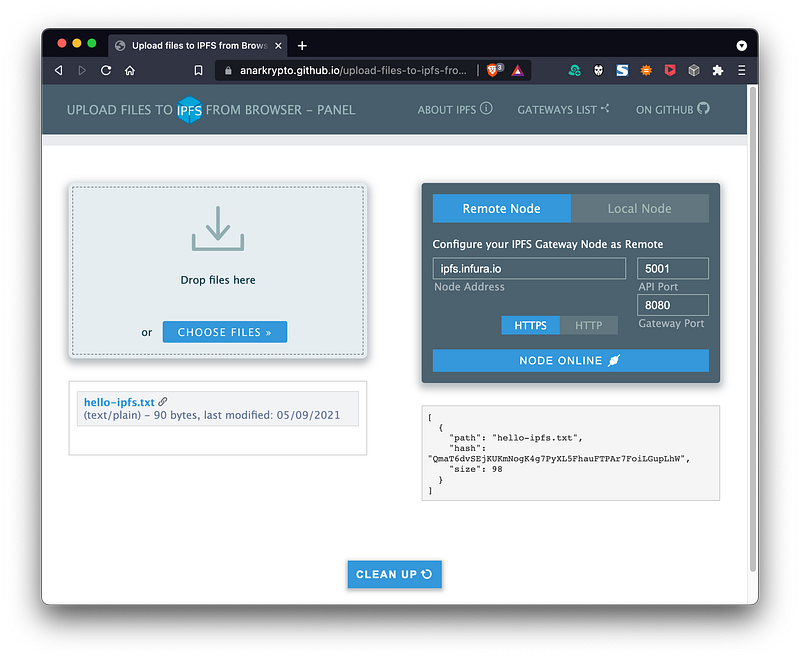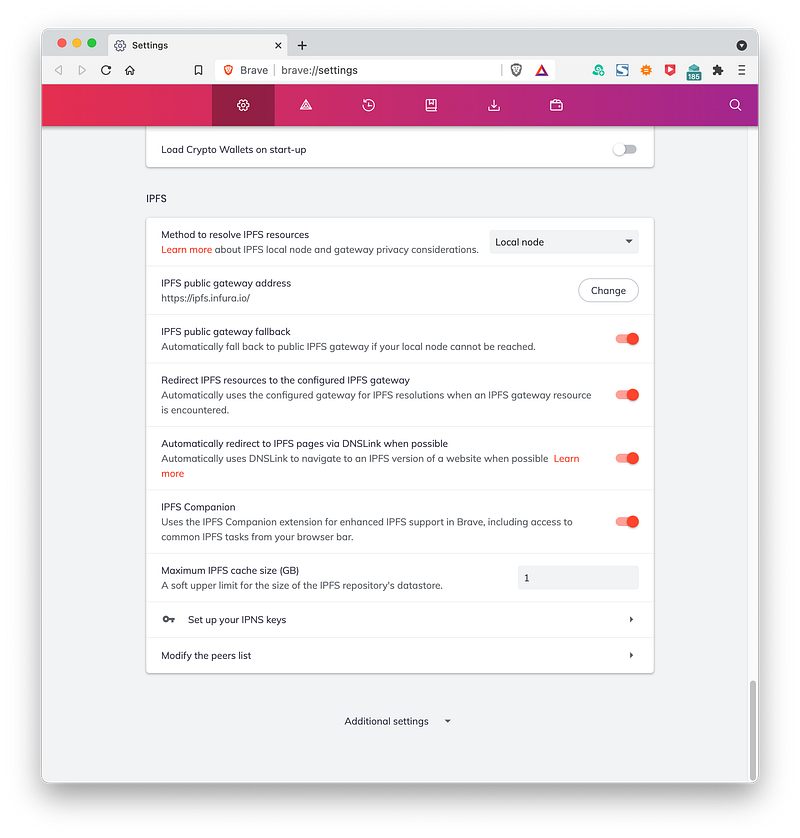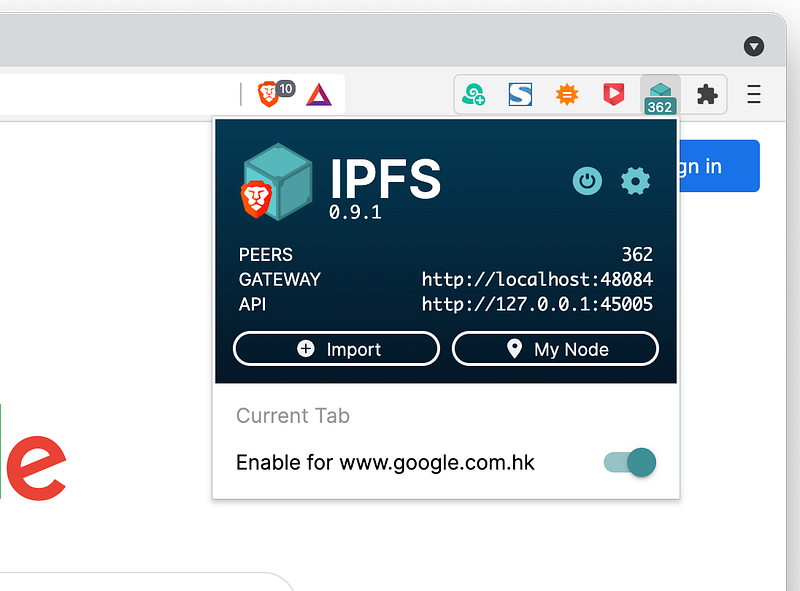
Want to try something new? Play around with InterPlanetary File System (IPFS). Definitely sound cool. The idea of having a decentralised P2P network to share files is not new, BitTorrent and Tor are still around, but what makes IPFS special this time is that it is much more user friendly and well integrated into common browsers. It has the potential to be an alternative network for essential current information. To read more about it, click here. https://docs.ipfs.io/concepts/what-is-ipfs/
To get started, it’s easy, can do it in 5 mins or less. Just load up this page. https://anarkrypto.github.io/upload-files-to-ipfs-from-browser-panel/public/

Just leave it on “Remote Node” mode, click on “Connect” and make sure it is showing “Node Online” like in the screenshot above. Then you can select any file on your computer to be uploaded to IPFS network. Make a small sample text file to upload, don’t try it with any personal or sensitive files, please don’t. After it has been uploaded, you will get a URL link to the file.


You can check out the test file I uploaded at https://ipfs.infura.io/ipfs/QmaT6dvSEjKUKmNogK4g7PyXL5FhauFTPAr7FoiLGupLhW
That was just a quick and easy way to get a file uploaded to IPFS network using an ordinary web page as a gateway. The file is now on a decentralised network, the link you get back, or the hash of the file, will be enough for you to get back the file as long as the file is still active on IPFS network. This is very similar to BitTorrent, if there are enough seeders/leeches (or just sharers) for a file, you can download quickly, otherwise you will have to wait around for available copies on the network. Just to be clear, once you upload the file to IPFS, you no longer have control of the file as such. That’s why you shouldn’t upload private files there without encryption.
Beyond just putting a file on IPFS, how about downloading from it, or contributing to the network? You will need to dig a little deeper. The quick way is to download Brave and enable the IPFS features (you can do it easily with Chrome too, just not directly built in). You are a few clicks away from being part of the network and sharing some of your resources back to the wider IPFS community. (I might write more about how to set it up, but generally, it’s just about using your IPFS as a local node rather than using it via other gateways. Look at the 2 screenshots below. And yes, I am still recommending Brave Browser.)


Now, you might ask, so what’s the big deal, why not just use dropbox, onedrive or any other cloud storage? Or just pay for your own web hosting? Bittorrent and Tor haven’t done enough bad things for piracy and dark web? What’s wrong with centralised solutions? Is this just an anti-establishment tech? How about filecoin, isn’t that suggesting IPFS is part of a crypto scam, why not use Chia?
I have my own answers to these, but still too early to tell if IPFS will be widely adopted to make these questions important. It isn’t a big deal for now, the web is working well, centralised systems are still mainstream, cost efficient and fast. So I am only playing around with it for now, not for any commercial use yet. But from a tech perspective, it is one of the best attempt for doing a fully decentralised web for now. There are many legit reasons for using it, particularly for situations where connectivity is low or simply unnecessary. If it is widely adopted, it can improve network efficiency at the cost of each user contributing a little bandwidth and storage on their devices. Like a very smart caching system, the most trendy cat video might be directly shared from the person watching it next to you on the train. Not just over 5G, but bluetooth, wifi, nfc, etc, all tech, all protocols, AI agents to crawl inside all digital devices and make the best use of all electrons to serve you. A tech utopia. (I should stop writing.)
But there are a few more tidbits I want to mention for now.
- Filecoin (a cryptocurrency) with IPFS, it’s not a bad idea to have an incentive scheme for “guaranteed” storage on the network. So the files will always be available rather than voluntarily accessible. But the fluctuations in crypto kind of made it more scammy than intended. Don’t just rely on coders to write economic algorithms. 🙂
- There are ways to use IPFS with Safari, with https://js.ipfs.io/, but it’s not neat. Haven’t seen any good extensions for this yet. On Mac, you can just use Brave instead.
- P2P is still not great on mobile, usage pattern and battery life are still major issues. Wait until we have excess battery life on mobile devices, it might work better then.
- Human readable URLs for IPFS. You can tell that it is still very much for geeks.
That’s it. Just sharing what I have been playing with. Feel free to share your comments below. Like most articles I write, these are just notes that I share and I will update it every now and then. Stay tuned.
Useful Links:
- What is IPFS? https://docs.ipfs.io/concepts/what-is-ipfs/
- What is IPFS? — A Beginner’s Guide — https://hackernoon.com/a-beginners-guide-to-ipfs-20673fedd3f
- Public Gateway Checker — https://ipfs.github.io/public-gateway-checker/
- Usage ideas and examples — https://docs.ipfs.io/concepts/usage-ideas-examples/
- Understand node types in IPFS Companion https://ipfs.mihir.ch/ipfs/bafybeiew7bbwhj4icr6llio6tuawfz2rymwdygxrjnmd2oouhlkl7gj62e/how-to/companion-node-types/
By Edward Tsang on .
Leave a Comment